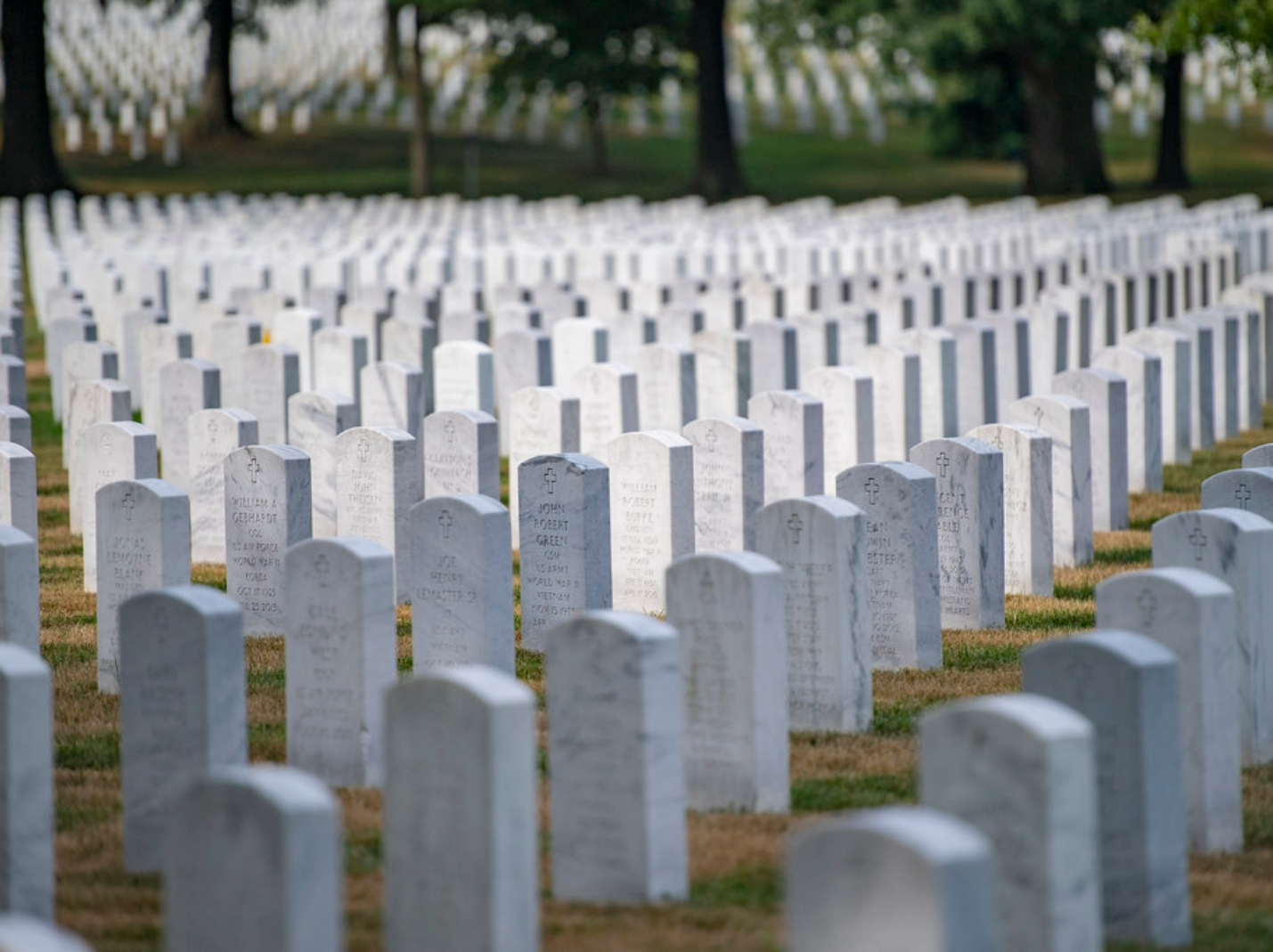
There’s something central to every political community about death.
As a result, you must deal with death if you’re going to lead. At the extreme, you have to order other people to shed their blood—and perhaps the blood of still others—for the city or country’s sake. Such was the perspective that Pericles brought to the grieving families of Athens in his timeless funeral oration and that Abraham Lincoln did in his Gettysburg Address. But even without orders, Death comes for us all, the members of any community. Some politicians don’t do well at funerals—they become stiff and wooden or improperly informal or visibly bored. Others seem naturals at it, with that combination of formality and intimacy that such occasions demand.
Perhaps it is fitting that the brouhaha over former President Trump’s appearance on 8/26 at Arlington Cemetery immediately precedes this year’s reminder of 9/11/2001. The current controversy seems absurd. That a former President does wrong by accepting the invitation of grieving families to share their memorial of their children and to place a wreath upon the Tomb of the Unknown—that this is wrong, while the current President lolls on the beach and the current Vice President, who wants to be President, doesn’t even respond to the families’ invitation, for fear of losing some Muslim votes in swing states?
The absurdity of this “controversy” —as if any of it is controversial— overshadows the basic facts: that these 13 soldiers were killed at Hamid Karzai Airport on 8/26/2021 due to a successful suicide bombing, amid a hasty, poorly executed retreat, ordered by Joe Biden and Kamala Harris.
But why a retreat in the first place? It marked the sad end to a war that both sides, right and left, had long disavowed. Trump, as well as Barack Obama, Biden, and Harris—all wanted it over. Did the Global War on Terror achieve any substantial strategic goals for the United States? Did it undermine civil liberties at home? This is a question historians and political commentators will debate for years. Still, while few Americans would call the Global War on Terror unjust, most would probably say that it failed to make anything better and even that it accompanied an erosion of privacy and other civil liberties in America. No one wants to be the last man to die for such a war. These families’ thirteen children were that man. They deserve comfort and compassion.
But what was this war for? It had been justified as a “response” to 9/11, first in Afghanistan, where some of the terrorists were hiding—though none of the hijackers or the leadership were themselves Afghans. Then, much later, Iraq was duplicitously attached to 9/11 and is forever now a blot on George W. Bush’s name.
So, if the response failed, how do we reckon with 9/11? By ignoring it—letting it fade away? By filing it away in a series of “America gets what it deserves” data points for arguments? Exile it from memory, or make it “mere history”? For neither’s quite right. There’s unfinished business here. As unfinished as the lives of the 2,977 innocents—2,605 Americans—murdered on 9/11, most of whom have no graves, no place where family members can go to mourn for this son or that daughter, only memorials, places that live only “in memory.” It is a precarious place to live since now the Western academy, leading much of the political class, actively seeks to erase the memory of the West.
The twentieth anniversary of 9/11 was nearly erased due to COVID-19. For a striking mental exercise, if you lived through both times, compare the profound sense of patriotism immediately after 9/11—when many Americans truly were asking, “What I can do for my country?”—to the COVID-19 days, when it seemed as though most people were clamoring—from behind their masks— “What can my country do for me?!”
The twenty-fifth anniversary takes place on 9/11/26. That leaves plenty of time for a—future—President of the United States to do it right. Maybe that’s what the events of the last week of August were the true “interview” for.
Image of Section 55 of Arlington National Cemetery, Arlington, Virginia, Aug. 5, 2019. by Arlington National Cemetery on Flickr
But why a retreat in the first place? It marked the sad end to a war that both sides, right and left, had long disavowed.”
No, some of us wanted to WIN that war, and like with Vietnam and Korea, it was the “rules of engagement” that prevented us from doing so. Today we would neither have nuked Hiroshima nor permitted MacArthur to impose “Americanism” upon Japan — today Baseball is more popular in Japan than in the US.
Homicide bombers are nothing new — back then they were called Kamikazes. In Vietnam, it was not uncommon for parents to hand a live (pin-pulled) grenade to a toddler and have the child run over and give it to the American soldiers. What no one realized is that we were dealing with non-Western countries that did not share our Western (small “l”) liberal values. People who did not place an inherent value on human life the way we do.
MacArthur’s solution to the problem of Japan was to impose Western values at gunpoint. (The British had done something similar in India, ending Sati (the practice of a widow being killed at her husband’s funeral) by threatening to prosecute all involved for murder. And as to “endless war”, the last two Japanese soldiers didn’t surrender until 1974 — and we *still* have troops in Vietnam.
Trump, as well as Barack Obama, Biden, and Harris—all wanted it over. Did the Global War on Terror achieve any substantial strategic goals for the United States? Did it undermine civil liberties at home? T